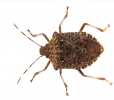
Problems with Stink Bugs around your home, are controllable under professional care. Our treatment goal is to stop a problem at its source so it doesn’t keep coming back. Using state-of-the art equipment and methods, our licensed exterminators will inspect your home’s environment and construction to identify the problem and determine the best course of action. Contact us today!
The Brown Marmorated Stink Bug is an agricultural pest and feeds on fruit, vegetables and farm crops. It is native to China, Japan, Korea and Taiwan and was most likely introduced on shipping crates to the United States. Officially it was first collected in September of 1998 in Allentown PA and it is currently prevalent in the Mid-Atlantic region, where it cycles through one generation per year.
The pest itself isn’t harmful, but is a nuisance to homeowners in the fall as it searches for protected overwintering sites. People will often become alarmed when these bugs enter their homes and noisily fly about. The stink bug does not reproduce inside structures or cause damage, but when crushed they will release a pungent odor that smells like cilantro.
This insect will pierce a fruit’s outer surface and suck out juices while injecting saliva. This damaged fruit is then not salable but it is not poisonous. The suction and saliva create a dimpling of the fruit’s surface, and rotting and corking of the flesh underneath.
Adults are approximately 5/8ths inch (16 mm) long with various shades of brown on both the upper and lower body surfaces. They are “shield” shaped with gray, off-white, black, copper, and blueish markings. Adults will emerge sometime in the spring (late April to mid-May), and mate and deposit eggs from May through August. The eggs hatch into small black and red nymphs that go through five molts.
Adults begin to search for overwintering sites starting in September through the first half of October. It is best to treat for them around this time so that they don’t establish themselves in your home. It should be noted that while methods do exist to control the populations around your home, complete eradication is not possible.
Mechanical exclusion is the best method to keep stink bugs from entering homes and buildings. Cracks around windows, doors, siding, utility pipes, behind chimneys, and underneath the wood fascia and other openings should be sealed. Damaged screens on doors and windows should be repaired or replaced.
A vacuum is the best way to remove live and dead stink bugs, however the bug smell may remain in the vacuum for some time. So a shop vac would be a better choice as it can more easily be washed out.
Where the task of completely sealing the exterior of a building is difficult, insecticides may offer some, short term relief. Inside spray insecticides, directed into cracks and crevices, will not prevent the bugs from emerging and while foggers will kill these insects, they will not prevent more insects from emerging shortly after the room is aerated.
Insecticidal dust treatments to wall voids may kill hundreds of bugs, but there is the possibility that other insects such as carpet beetles will be attracted to and feed on the dead Stink Bugs and then spread throughout the house.